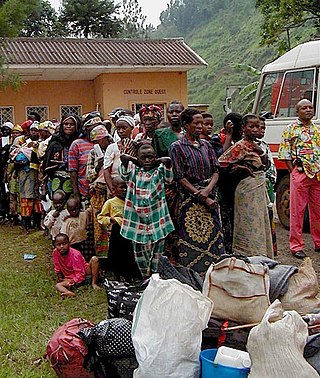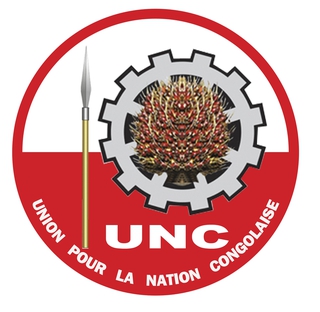
Politics of the Democratic Republic of Congo take place in a framework of a republic in transition from a civil war to a semi-presidential republic.

Laurent-Désiré Kabila or more succinctly, Laurent Kabila, was a Congolese revolutionary and politician who served as the third President of the Democratic Republic of the Congo from 1997 until his assassination in 2001.

The Democratic Republic of the Congo, also known as Congo-Kinshasa, and known from 1971–1997 as Zaire, is a country in Central Africa. By land area, the DRC is the second-largest country in Africa and the 11th-largest in the world. With a population of around 112 million, the Democratic Republic of the Congo is the most populous officially Francophone country in the world. The national capital and largest city is Kinshasa, which is also the economic center. The country is bordered by the Republic of the Congo, Central African Republic, South Sudan, Uganda, Rwanda, Burundi, Tanzania, Zambia, Angola, the Cabinda exclave of Angola and the South Atlantic Ocean.

Joseph Kabila Kabange is a Congolese politician who served as President of the Democratic Republic of the Congo between January 2001 and January 2019. He took office ten days after the assassination of his father, President Laurent-Désiré Kabila in the context of the Second Congo War. He was allowed to remain in power after the 2003 Pretoria Accord ended the war as the president of the country's new transitional government. He was elected as president in 2006 and re-elected in 2011 for a second term. Since stepping down after the 2018 election, Kabila, as a former president, serves as a senator for life.

The president of the Democratic Republic of the Congo is the head of state of the Democratic Republic of the Congo and commander-in-chief of the armed forces.

Léon Kengo wa Dondo is a Congolese politician who served as the "first state commissioner" several times under Mobutu Sese Seko in Zaïre. He was one of the most powerful figures in the regime and was a strong advocate of economic globalization and free-market economics. He served as President of the Senate of the Democratic Republic of the Congo from 2007 to 2019.

The Second Congo War, also known as the Great War of Africa or the Great African War, began in the Democratic Republic of the Congo in August 1998, little more than a year after the First Congo War, and involved some of the same issues. Eventually involving belligerents from across the African continent, the war officially ended in July 2003 when the Transitional Government of the Democratic Republic of the Congo took power. Although a peace agreement was signed in 2002, violence has continued in many regions of the country, especially in the east. Hostilities have continued since in the ongoing Lord's Resistance Army insurgency, and the Kivu and Ituri conflicts. Nine African countries and around twenty-five armed groups became involved in the war.

The First Congo War (1996–1997), also nicknamed Africa's First World War, was a civil war and international military conflict which took place mostly in Zaire, with major spillovers into Sudan and Uganda. The conflict culminated in a foreign invasion that replaced Zairean president Mobutu Sese Seko with the rebel leader Laurent-Désiré Kabila. Kabila's unstable government subsequently came into conflict with his allies, setting the stage for the Second Congo War in 1998–2003.

Étienne Tshisekedi wa Mulumba was a Congolese politician and the leader of the Union for Democracy and Social Progress (UDPS), the main opposing political party in the Democratic Republic of the Congo (DRC). A long-time opposition leader, he served as Prime Minister of the country on three brief occasions: in 1991, 1992–1993, and 1997.
The Movement for the Liberation of the Congo is a political party in Democratic Republic of the Congo. Formerly a rebel group operating in the Democratic Republic of Congo that fought the government throughout the Second Congo War, it subsequently took part in the transitional government and is one of the main opposition parties.

The People's Party for Reconstruction and Democracy is a political party in the Democratic Republic of the Congo. It is the political structure established by the former president of the country, Joseph Kabila.
The Church of Christ in the Congo or CCC, is a union of 62 Protestant denominations, in the Democratic Republic of the Congo.

Jean-Pierre Bemba Gombo is a politician in the Democratic Republic of the Congo (DRC). He has served as the DRC's Vice Prime Minister and defence minister since 2023. He was previously one of four vice-presidents in the transitional government of the Democratic Republic of the Congo from 17 July 2003 to December 2006. He led the Movement for the Liberation of the Congo (MLC), a rebel group turned political party. He received the second-highest number of votes in the 2006 presidential election. In January 2007, he was elected to the Senate.

Corruption in the Democratic Republic of the Congo, which used to be an institutionalized part of the state, has been relatively lowered in recent years. However, it continues to exceed corruption in comparison to most states. The BBC's DRC country profile calls its recent history "one of civil war and corruption." President Joseph Kabila established the Commission of Repression of Economic Crimes upon his ascension to power in 2001.
The Congolese Rally for Democracy–Goma was a faction of the Congolese Rally for Democracy, a rebel movement based in Goma, Democratic Republic of the Congo (DRC) during the Second Congo War (1998–2003). After the war, some members of the group continued sporadic fighting in North Kivu. The movement also entered mainstream politics, participating in democratic elections with little success.

The Palais de la Nation is the official residence and principal workplace of the President of the Democratic Republic of the Congo. It is strategically situated in Gombe, north of Kinshasa, adjacent to the course of the Congo River, and has held its role since 2001, following the assassination of Laurent-Désiré Kabila.

The Union for the Congolese Nation is a political party in the Democratic Republic of the Congo. It was founded in 2010 by Vital Kamerhe, who was at the time a close ally of the former president Joseph Kabila. Kamerhe had previously served as the Chief of Staff to Kabila and as the Speaker of the National Assembly.

The People's Palace or Palace of the People is the seat of the National Assembly and the Senate in Kinshasa, Democratic Republic of Congo, formerly Zaire. It was completed in 1979 with a line of credit from the People's Republic of China. It has witnessed key moments in the country's political landscape, bearing witness to historic debates, legislative triumphs, and the exercise of democratic values. The building serves as a gathering place for lawmakers and a venue for official ceremonies.

General elections were held in the Democratic Republic of the Congo on 30 December 2018, to determine a successor to President Joseph Kabila, as well as for the 500 seats of the National Assembly and the 715 elected seats of the 26 provincial assemblies. Félix Tshisekedi (UDPS) won with 38.6% of the vote, defeating another opposition candidate, Martin Fayulu, and Emmanuel Ramazani Shadary, backed by the ruling party PPRD. Fayulu alleged that the vote was rigged against him in a deal made by Tshisekedi and outgoing President Kabila, challenging the result in the DRC's Constitutional Court. Different election observers, including those from the country's Roman Catholic Church, also cast doubt on the official result. Nonetheless on 20 January the Court rejected his appeal and declared Tshisekedi as the winner. Parties supporting President Kabila won the majority of seats in the National Assembly. Félix Tshisekedi was sworn in as the 5th President of the Democratic Republic of the Congo on 24 January 2019, making it the first peaceful transition of power in the country since it became independent from Belgium in 1960.
The Truth and Reconciliation Commission was a truth commission which ran from July 2003 - February 2007 to investigate and promote national unity as a response to the atrocities committed in the war in the Democratic Republic of Congo between the Congolese army, Congolese rebels, and foreign insurgents.















